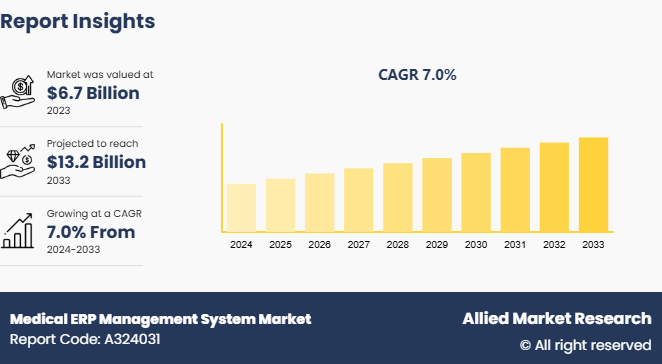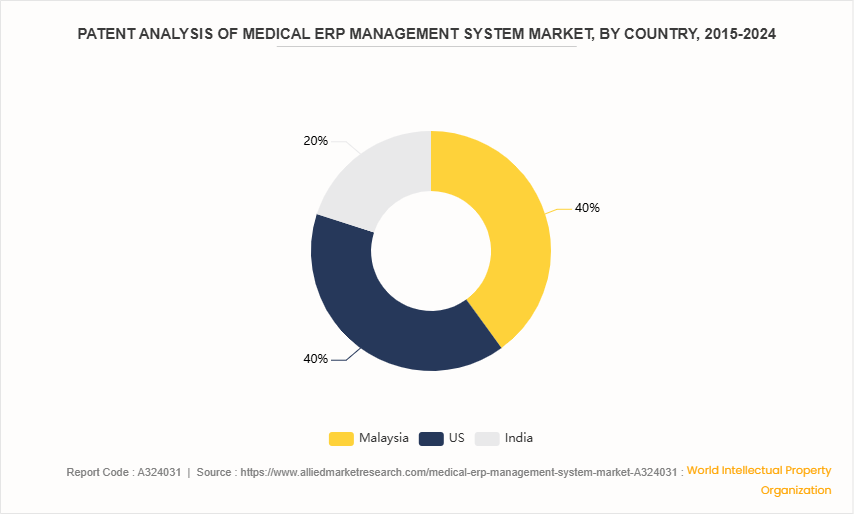Medical ERP Management System Market Research, 2033
The global medical ERP management system market size was valued at $6.7 billion in 2023, and is projected to reach $13.2 billion by 2033, growing at a CAGR of 7% from 2024 to 2033. The medical ERP management system market is driven by the increasing need for efficient healthcare operations, including streamlined patient management, inventory control, and billing processes. In addition, surge in adoption of digital transformation in healthcare facilities and need for regulatory compliance fuel medical ERP management system market growth.

Market Introduction and Definition
A Medical ERP (Enterprise Resource Planning) management system is an integrated software solution designed to streamline and automate various operational processes within healthcare organizations. It connects different departments, including finance, human resources, inventory management, patient care, and billing, into a unified system, facilitating real-time data sharing and efficient decision-making. By centralizing data, a medical ERP system enhances communication and collaboration among hospital staff, ensuring accurate patient records, optimized resource utilization, improved inventory management, and compliance with regulatory standards. This system aims to reduce administrative costs, enhance productivity, and improve patient care outcomes, making it a vital tool for healthcare institutions to manage their operations more effectively and provide high-quality services.
Key Takeaways
- The medical ERP management system market study covers 20 countries. The research includes a segment analysis of each country in terms of value ($Million) for the projected period 2024-2033.
- More than 1, 500 product literatures, industry releases, annual reports, and other such documents of major medical ERP management system industry participants along with authentic industry journals, trade associations' releases, and government websites have been reviewed for generating high-value industry insights.
- The study integrated high-quality data, professional opinions and analysis, and critical independent perspectives. The research approach is intended to provide a balanced view of global markets and to assist stakeholders in making educated decisions in order to achieve their most ambitious growth objectives.
Key Market Dynamics
The medical ERP management system market size is driven by several key factors, including the increasing adoption of digital technologies in healthcare, the need for efficient resource management, and the demand for improving operational efficiency. Hospitals and healthcare institutions are increasingly relying on ERP systems to streamline their operations, including inventory management, patient care, billing, and procurement, thus improving overall performance. The need for integrated solutions that can manage vast amounts of healthcare data is also fueling market growth, as healthcare providers strive for a more unified approach to patient information and clinical operations.
However, there are significant restraints hindering the medical ERP management system market growth. High implementation costs, including software, hardware, and employee training, pose challenges for smaller healthcare providers and clinics. In addition, resistance to change from healthcare staff and concerns about data security and privacy issues with cloud-based ERP systems are limiting adoption. For instance, the implementation of ERP systems may require substantial time and resources, leading to initial productivity loss and dissatisfaction among staff who are not familiar with the new systems. The healthcare industry is also governed by strict regulatory requirements, and ensuring that ERP systems comply with these regulations, such as HIPAA in the U.S., further complicates the adoption process.
Despite these challenges, the market presents substantial opportunities for growth, especially in emerging economies. As healthcare providers in regions like Asia-Pacific and Latin America seek to modernize their operations and improve patient care, the demand for affordable and scalable ERP solutions is expected to rise which further drive growth during medical ERP management system market forecast. Moreover, the ongoing trend of mergers and acquisitions in the healthcare sector presents an opportunity for ERP systems to play a crucial role in integrating different entities and streamlining their operations. In addition, the growing focus on value-based care, which requires efficient resource management and patient outcome tracking, is expected to drive the demand for ERP systems. Healthcare providers looking to leverage AI, IoT, and big data analytics for better decision-making will further accelerate ERP adoption, enhancing patient outcomes and operational efficiency.
Market Segmentation
The medical ERP management system industry is segmented into function mode, deployment, end user, and region. On the basis of function mode, the market is classified into inventory & material management, supply chain & logistics management, patient relationship management, finance & billing, and others. By deployment, the market is bifurcated into on-premises and cloud. By end user, the market is divided into hospitals, clinics, and others. Region wise, the market is analyzed across North America, Europe, Asia-Pacific, and LAMEA.
Regional/Country Market Outlook
North America has largest medical ERP management system market share is primarily driven by the growing demand for streamlined operations within healthcare organizations. As hospitals and healthcare providers face increasing pressure to enhance operational efficiency and reduce costs, medical ERP systems offer integrated solutions that consolidate functions such as patient management, inventory control, financial accounting, and compliance reporting. The rise of value-based care models and the shift towards electronic health records (EHR) further contribute to the need for robust ERP solutions that ensure data consistency and improve decision-making processes.
In addition, regulatory compliance requirements, including those from the Health Insurance Portability and Accountability Act (HIPAA) , are pushing healthcare providers to adopt systems that guarantee secure and compliant data management. The increasing adoption of cloud-based ERP solutions in North America is also boosting market growth by providing scalable, cost-effective solutions that allow healthcare organizations to manage resources efficiently and collaborate seamlessly. Furthermore, the growing focus on patient-centered care and the integration of advanced analytics and AI into ERP systems are driving innovation and enabling healthcare providers to optimize their operations and improve patient outcomes.
Industry Trends
- Medical ERP systems are increasingly being integrated with other healthcare technologies, such as Electronic Health Records (EHR) , Picture Archiving and Communication Systems (PACS) , and Hospital Information Systems (HIS) , allowing for streamlined operations and improved patient care.
- With the growing importance of patient data privacy, there is a strong emphasis on compliance with healthcare regulations such as HIPAA and GDPR. Medical ERP systems are being developed with advanced security features to ensure data integrity and prevent breaches.
Patent Analysis, By Country, 2015-2024
Malaysia and U.S witnessed the highest number of patent approvals and applications, due to advanced healthcare infrastructure, strong research and development sectors, and the growing demand for efficient healthcare management solutions to improve operational efficiency and patient care in the country.

Competitive Landscape
The major medical ERP management system market share players operating in the medical ERP management system market include McKesson Corporation, Oracle, SAP SE, Microsoft, Aptean, Odoo, Infor, Epicor Software Corporation, SAGE Group PLC, QAD Inc.
Recent Key Strategies and Developments
- In May 2024, SAP announced the integration of Amazon Web Services Bedrock generative AI into its AI Core. This integration aims to enhance the performance and efficiency of cloud-based enterprise workloads and embed generative AI capabilities into clients' critical business applications.
- In September 2023, Infor reported that Wayne HealthCare has successfully transitioned its financial and interoperability systems to the cloud using Infor's technology.
- In September 2023, Oracle updated multiple applications within its Fusion Cloud suites to support the needs of healthcare enterprise customers better. These updates span across its ERP, Enterprise Performance Management (EPM) , Human Capital Management (HCM) , and Supply Chain and Manufacturing (SCM) Clouds. The changes are designed to help healthcare organizations streamline operations and enhance patient care.
- In January 2020, Infor acquired Intelligent InSites, Inc., a healthcare software and services provider based in North Dakota. Intelligent InSites, Inc. provides businesses with dynamic, scalable, and intuitive location platforms to optimize operations, streamline patient journeys, and enhance clinical outcomes. Through this acquisition, Infor expanded its technological offerings portfolio and strengthened its business footprint in clinics, emergency departments, urgent care, procedural care, inpatient care, and behavioral health.
Key Benefits for Stakeholders
- This report provides a quantitative analysis of the Medical ERP management system market segments, current trends, estimations, and dynamics of the Medical ERP management system market analysis from 2023 to 2033 to identify the prevailing medical ERP management system market opportunity.
- Market research is offered along with information related to key drivers, restraints, and opportunities.
- Porter's five forces analysis highlights the potency of buyers and suppliers to enable stakeholders to make profit-oriented business decisions and strengthen their supplier-buyer network.
- In-depth analysis of the Medical ERP management system market segmentation assists to determine the prevailing market opportunities.
- Major countries in each region are mapped according to their revenue contribution to the global Medical ERP management system market Statistics.
- Market player positioning facilitates benchmarking and provides a clear understanding of the present position of the market players.
- The report includes the analysis of the regional and global Medical ERP management system market trends, key players, market segments, application areas, and market growth strategies.
Key Sources Referred
- Centers for Disease Control and Prevention
- World Health Organization
- National Center for Biotechnology Information
- The Lancet
- National Perinatal Epidemiology and Statistics Unit (NPESU)
- Science Direct
- Health Resources and Services Administration (HRSA)
- Department of Health and Human Services (HHS)
- National Institutes of Health (NIH)
Medical ERP Management System Market Report Highlights
| Aspects | Details |
| Market Size By 2033 | USD 13.2 Billion |
| Growth Rate | CAGR of 7% |
| Forecast period | 2024 - 2033 |
| Report Pages | 260 |
| By Function Mode |
|
| By Deployment |
|
| By End User |
|
| By Region |
|
| Key Market Players | The Sage Group PLC, Aptean Corporation, Infore, Epicor Software Corporation, Oracle, Microsoft Corporation, SAP SE, Odoo, McKesson Corporation, QAD Inc. |
McKesson Corporation, Oracle, SAP SE, Microsoft, Aptean, Odoo, Infor, Epicor Software Corporation, SAGE Group PLC, QAD Inc. are the top companies to hold the market share in Medical ERP Management System
The medical ERP management system market was valued at $6.7 Billion in 2023 and is estimated to reach $13.2 Billion by 2033, exhibiting a CAGR of 7% from 2024 to 2033.
North America is the largest regional market for Medical ERP Management Systems, accounting for a significant revenue share in 2023. This dominance is driven by the need for improved operational efficiency, advanced healthcare infrastructure, compliance with regulatory requirements, and the presence of several market players undertaking strategic initiatives
The leading application of the Medical ERP Management System Market is patient management, which streamlines patient registration, appointment scheduling, and medical records maintenance. This is driven by the need for efficient healthcare delivery, improved patient experiences, and regulatory compliance.
The global Medical ERP Management System market is witnessing trends such as the integration of AI and machine learning for predictive analytics, the adoption of cloud-based solutions for scalability and accessibility, and increasing emphasis on interoperability to enhance data exchange across healthcare systems. Enhanced cybersecurity measures are also gaining focus to protect sensitive healthcare data.
Loading Table Of Content...



